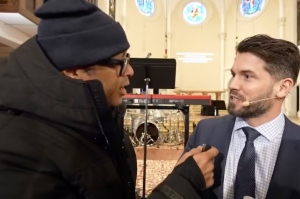Cult of individualism and the loneliness epidemic

People often ask me, “Why do you still read The New York Times”?
My answer is twofold. First, it is something of an addiction, one I acquired as an 18-year-old college freshman in 1965 (Alas, the Times was a much more impressive newspaper in 1965 than it is today). Even though now it far too often editorializes in its news spaces and propagandizes in its editorial columns, it still does on occasion provide in-depth news stories on subjects other papers do not cover and provides facts in other stories that are omitted from the columns of their competitors.
A classic example was provided by their columnist Nicholas Kristof on September 6th, “How We Can Fix Our Loneliness Epidemic". This column is “the fourth in the series ‘How America Heals,’ in which Nicholas Kristof is examining the interwoven crises devastating working-class America and exploring paths to recovery.”
Kristof arrests the reader’s attention immediately with his opening lines:
‘LONELINESS CRUSHES the soul, but researchers are finding it does far more damage than that. It is linked to strokes, heart disease, dementia, inflammation, and suicide; it breaks the heart literally as well as figuratively.”
This statement illustrates both the insight and limitations that The New York Times worldview can provide. Yes, loneliness “crushes the soul,” but the catastrophic health consequences are not “linked to” loneliness, but are the inevitable results or consequences of loneliness.
Why is this so? Our Heavenly Father and Creator has revealed this vital information to us from the beginning. God looked upon His creation in Genesis and declared it “was good.” The first negative note is sounded in Genesis when God declares, “It is not good that the man should be alone; I will make a help meet for him.” (Gen. 2:18)
The declaration “not good” is the strongest usage available in the Hebrew tongue, intimating a strong adversative to “good.” In other words, it was not good for man to be alone before the “fall” into sin. After the fall, it becomes catastrophic for man (or woman) to be alone.
God reveals Himself in Holy Scripture to be a God who created human beings for fellowship with Him and fellowship with each other. The history of humankind since Adam and Eve’s fall certainly bears witness to the eternal spiritual truth that “it is not good for man to be alone.”
Yet, America has largely ignored this essential and elemental truth, with increasingly disastrous consequences.
Kristof summarizes the fact that the corrosive and destructive impact of systemic, societal loneliness is in no way merely an American phenomenon. The United Kingdom has established a minister for “loneliness.” Japan and Sweden have launched similar public policy initiatives.
The U.S. Surgeon General issued an 81-page report this spring entitled “Our Epidemic of Loneliness and Isolation.” According to the Surgeon General’s report, loneliness is lethally dangerous, perhaps more dangerous than alcohol, tobacco and obesity, adding that loneliness is getting worse in America and left unaddressed “we will further retreat in our corners—angry, sick and alone.”
None of this, sadly, should surprise American Christians as we have lived and experienced the cult of individualism and its deleterious impact on our culture. Ever-widening concentric circles of destruction have been wrought by the siren song of narcissistic self-worship and unwavering devotion to that cult’s unholy trinity of “I, Myself, and Me.”
As far back as 2000, Harvard political scientist Robert David Putnam identified this increasing polarization and isolation in his influential book, Bowling Alone. Using bowling as an analogy, Putnam documented the collapse since the 1960s in our associational, civic, political, religious, and social life which he summarized as “social capital.”
Too many Americans' headlong pursuit of individual “self-fulfillment” and “self-actualization” at the expense of their responsibilities as spouses, parents, citizens, church members and friends, has led to epidemic levels of social isolation as families have fragmented and virtually all of the mediating institutions in American life have atrophied.
One heartbreaking quantification of this existential truth is summarized in another Nicholas Kristof column, “The One Privilege Liberals Ignore.”
“The United States is an outlier in family breakdown. A Pew study of 130 countries found that American children were more likely to live with a single parent than those of any other nation.”
This is one category where America should not be proud to declare, “we’re number one!”
What does this number one rating look like in practice? Approximately 30 percent of American children are currently living with a single parent or with no parent at all. Sadly, single-mother families are five times more likely to be below the poverty level than married two-parent families.
Kristof reports that a book to be published next week, Melissa S. Kearney's The Two-Parent Privilege, reports, “Two-parent families are beneficial for children,” and concludes, “Places that have more two-parent families have higher rates of social mobility.”
One of the most comprehensive and disturbing studies documenting the “de-socializing” and “atomizing” of American society was a 2003 study, a report to the Nation from the Commission on Children at Risk entitled Hardwired to Connect: The New Scientific Case for Authoritative Communities.
The Commission warned that one in five American children were at serious risk for emotional, psychological, and physiological problems because of a “connection” crisis. Its report, co-sponsored by the YMCA, Dartmouth Medical School, and the Institute for American Values, presented extensive scientific evidence that the human brain is hardwired for two fundamental kinds of connection: horizontally, in close relationships with other human beings; and vertically, in finding moral and spiritual meaning through a relationship with a transcendent divine being.
The collapse of virtually all the mediating institutions in our culture is characterized by the Commission on Children at Risk as nothing less than the imposition of collective emotional, spiritual, psychological, and physiological abuse on an entire generation of our children!
As Christians, we should not be surprised. Our Heavenly Father has told us, “it is not good for man to be alone.” In the New Testament, our Heavenly Father has commanded us, as Christians, “Not to forsake the assembling of ourselves together, as the manner of some is” (Heb. 10:25).
It is clear from God’s revelation of Himself and His timeless truth in the New Testament that even Christians, after they have accepted Jesus as their Lord and Savior, cannot become all God desires them to be alone, apart from fellowship with one another. It is only together, in fellowship in a local church, can we as individual Christians plumb the depths, scale the heights, and embrace the width of all God has prepared for each of us as we seek to discern and to do His will and fulfill His purposes for each of our lives.
Insisting on being spiritual “lone rangers” will lead us astray and will keep us from being the fathers, mothers, sons, daughters, brothers, sisters, aunts, uncles, grandparents and friends God intends us to be and all the people in our lives need for us to be.
Dr. Richard Land, BA (Princeton, magna cum laude); D.Phil. (Oxford); Th.M (New Orleans Seminary). Dr. Land served as President of Southern Evangelical Seminary from July 2013 until July 2021. Upon his retirement, he was honored as President Emeritus and he continues to serve as an Adjunct Professor of Theology & Ethics. Dr. Land previously served as President of the Southern Baptist Convention's Ethics & Religious Liberty Commission (1988-2013) where he was also honored as President Emeritus upon his retirement. Dr. Land has also served as an Executive Editor and columnist for The Christian Post since 2011.
Dr. Land explores many timely and critical topics in his daily radio feature, “Bringing Every Thought Captive,” and in his weekly column for CP.



























